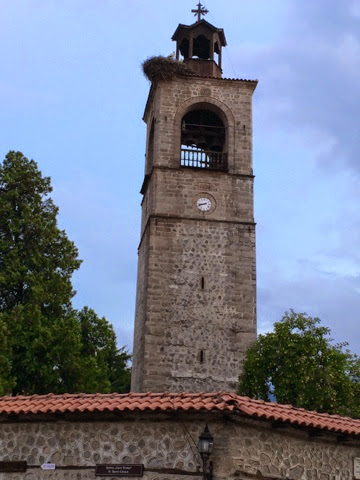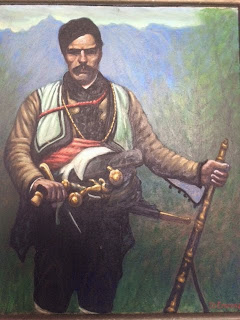Now that everyone has returned and is settling into their normal rhythm here in the Northwest, it is time to process the massive and somewhat overwhelming amount of music we were able to record along our journey. I would like to take the time to describe some of this for our audience as not everyone will be able to hear our new pieces in the November Town Hall concert and we will be able to present only a fraction of what we learned.
Many of you know that through my family, I have been listening to Bulgarian folk music since I was born and have been several times to the country. I wasn't introduced to the arranged choral music made so famous throughout the world by Philip Koutev until after college. Much of what I heard growing up came from old records of the 50s, 60s, 70s, and 80s; Balkanton, Jugoton, Radio Televisia (add location here), etc. Other music was from field recordings made or collected by various American folk dance teachers. Anyone who has listened to folk dance music of these eras can hear the difference between it and the arranged multi-voice pieces which grew in popularity at the same time.Village singers traditionally learned from other family members or others in their same village. Professionally trained singers study in music schools and learn to sing the styling from all regions of Bulgaria. When learning with one master teacher, we were told that professional singers needed to change their vocal quality in order to sing in extremely high and low ranges as well as to maintain their singing voices for hours at a time. Traditional singers might sing for gatherings, holidays and festivals, even hours at a time, but not daily and certainly not in extreme ranges for their "chest voice".
All this is to set the background for the astounding amount of variability in vocal music that comes out of one small country, both in terms of vocal production and in terms of regional style. This variability, even the small fraction of which Dunava attempts to faithfully represent, is no small feat to produce. My goal for Dunava on this trip was to hear as much distinct music from the "source" as possible in order that we can have the same understanding of what music we are trying to present. In this, we were largely successful. In musical selection and vocal presentation we strive to be as accurate as possible. Collectively experiencing on this trip that we attempt to emulate two sources in Bulgarian vocal music, village and professional ensemble, not just one, was vital for our choir. Through the connections of our guides, our friends, and our own, we were immersed in a range of singing professionalism; from individuals singing only their specific villages's songs to small town ensemble members presenting regional medleys, to other small town choirs singing pan-Bulgarian favorites (as opposed to village specific songs), to members of the great and internationally acclaimed vocal ensembles. This is by no means meant to rank anyone's ability, but rather to highlight the difference in what people sang for us and taught us.
The first music we heard was in Sofia, capital of the country and center of the Shope region. Two amazing components, the Mitevi brothers and 3 musicians (kaval/end blown flute, gudulka/bowed lira, and tambura/long necked mandolin) who play in the national orchestras, graced our evening. Everyone was fabulous. (Note: I shan't list all names in this post as they should all be noted in previous posts about these events. If anyone wants more detail, please contact us). The professional musicians were trained so well that they provided backup music for the two Shope singers on 1 or 2 songs, backup for Tsvetanka's Thracian songs, and then favorite instrumental pieces from all over Bulgaria. The two singers (Shope singing is mostly done with a melody line and a drone), presented a selection of unarranged songs with close second intervals and a distinct kind of vibrato that is only sung in the Shope area. Listen to the clips so you can hear the types of music shared with us that night.
In Varna, a city five hours drive east to the opposite side of the country on the Black Sea, our evening music was played by the talented group "Pendari", headed, I believe, by Nikolai Doctorov. This group of musicians were also members of Ensemble Varna (the city's professional music, vocal and dance troupe equivalent to Sofia's Koutev Ensemble). Interestingly enough, until the musicians played tunes local to the Dobrudzha region, the music was remarkably similar to what we heard from the musicians in Sofia. Once we began to hear melodies like Zborenka, Varnenski Kjuchek, Danets, and Ruka, then the music and musicianship took on a very different flavor despite the use of the same instrumentation.
Audio Sample: Varnenski Kjuchek
In Sredets, a town in the Strandzha region of southeast Bulgaria, our music was noticeably different from the beginning. We spent the evening with part of the group "Bozhura", a men's choir with musicians. Their songs (as all songs in the east part of Bulgaria), are sung in unison. Here they were accompanied by only bagpipe and drum (gaida and tupan). Percentage-wise there are far fewer men's vocal groups in Bulgaria. Group singing is often presented by women even though many men sing as soloists. The only other men's group we heard, "Banski Starcheta", was in Bansko, a town in the far southwest of Bulgaria, and the two choirs couldn't be more different. Though they both presented songs traditional to their regions, the vocal production, ornamentation, and all the little components that make up a each groups style have little in common with each other.
Audio Sample: Bozhura
Audio Sample: Bansko
The last musical group I want to share is the "Boyana Ensemble" from the town of Kostandovo in the northwest foothills of the the Rhodope mountains. The Rhodopes are in the south of Bulgaria but the range is large enough that music from Kostandovo has little in common with typical Rhodope music even though it is geographically in the same region. (Being on the northwestern edge, it it is also geographically close to the Pirin mountains (read Pirin music style) and the end of the Thracian plains (read Thracian music style). Rhodope vocal music is almost always sung by a single singer accompanied by a gaida. A few girls learned some Rhodope songs during our lessons in Kotel. The music we heard in Kostandovo had dumbek (small hand drum), accordion, and tambura. Always in two-voices, melody and drone, variations of both men's and women's groups presented Pomashko and Kostandovo village songs. To my less experienced ear, the music sounded Pirin or Macedonian, but there is a subtle difference that I am not yet clear on as to what makes the music Pomashko. Tsvetanka tried to explain something about chords and rhythms but it the rush of the moment it somehow still didn't click for me. Regardless of my ignorance, note the large distinction between this music and the rest you have hard so far.
Audio Sample: Ensemble Boyana
Now, let's move onto the choir music which we learned from professional singers in Varna, Kotel, Pazardzhik, and Sofia. Here, location matters less, as these women sing arrangements from all over Bulgaria. Each specializes in her own home region and may more often solo with pieces from their home region, but they are masters of all. We studied two medleys from the Shope and Dobrudzhan regions, and then many single region pieces from Shope, Thrace, and unknown or pan-Bulgarian arrangements. Here are two samples of us learning arranged pieces (which we are not currently going to perform).
Audio Sample: Ogrejala (with Tzvetanka Varimezova and Pazardzhik Ensemble)
Audio Sample: Mori Djulber Sevdo (with Sashka Chenkova and Abagar Quartet)
The original state music ensembles of the 1950s were modeled directly after Soviet choirs (e.g. the Soviet Pyatnitzy Choir) but have ever after taken on a life of their own with a beautiful range and depth of music that far surpasses their original inspiration. Nowadays, many youth study "national" music in both folk music schools such as the one we stayed at in Kotel and in larger universities throughout the country. As a result, their is a natural standardization that has happened even within regional styles, but at the same time, a far greater number of people with unbelievable musical talent. More about this can be read elsewhere but for Dunava's part, we were able to experience this passing on of folk music by studying with singers of several generations; long time director of the Varna choir, Yordanka Nadyelcha, the 20s-30s professional singers brought in to the Kotel school from the Abagar quartet, and then some middle schooler/early teens who helped teach us in Bansko).
And with the above final sound clip, I will bid our readers adieu and keep this post to a readable length. I hope you have enjoyed hearing some of the amazing variety of music which Dunava was able to experience in Bulgaria this summer. We hope to share as much as we can with you throughout this next year. If you are near Seattle, don't forget to come to our Town Hall performance on November 8th. We'll be presenting much new music there and you're sure to enjoy the wonderful venue.
Enjoy, and Happy Music Making!
Ramona and Dunava














































